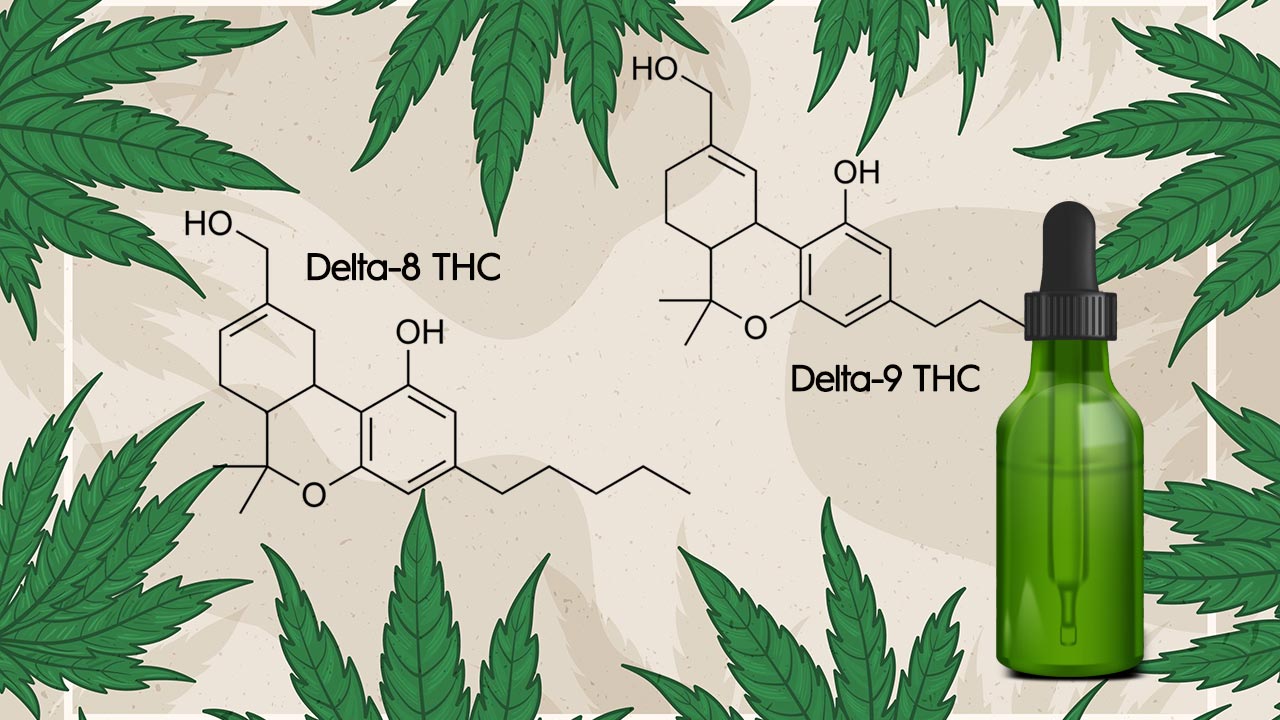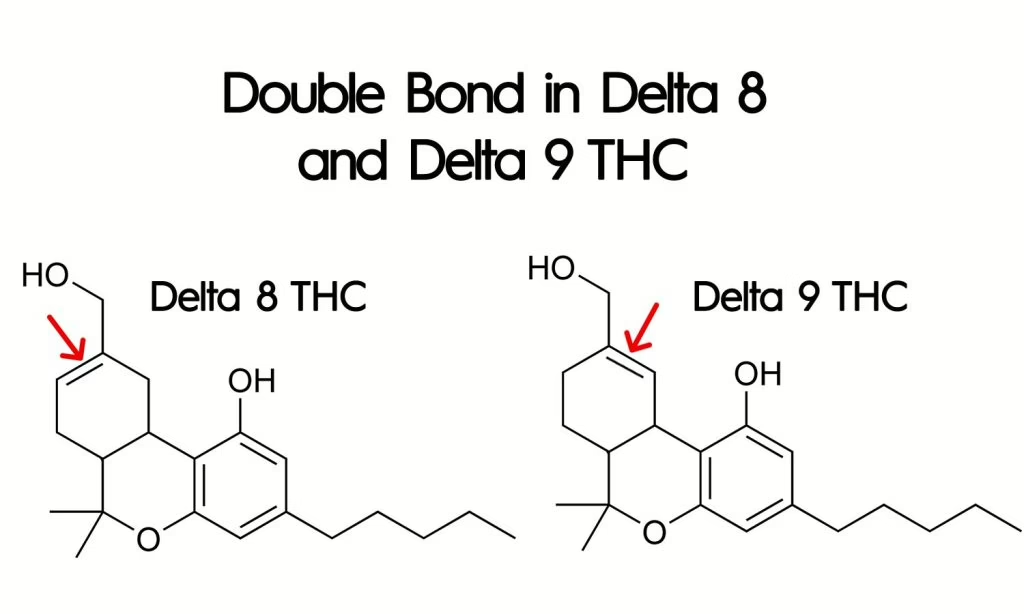Things to Know about Delta-8 and Delta-9 THC
Summarize

Table of Contents
Delta-8 THC and Delta-9 THC: What Are the Differences?
Delta-8 THC and Delta-9 THC come from the Сannabis Sativa plant. Delta-8 is a tetrahydrocannabinol (THC) analog which means it has a chemical structure similar to another compound, in this case, Delta-9, but has different properties.
Delta-8 is a minor cannabinoid. A minor cannabinoid is one that is not abundant in the cannabis plant. The cannabis plant has more CBD and Delta-9 THC than Delta-8 THC, making the extraction of Delta 8 and Delta 9 much more difficult.
Delta-8 is chemically similar to Delta-9 but is not the same. They both have a double bond which researchers believe produces the high people experience. However, the double bond is in a different place in Delta 8 and Delta 9. Delta-8 is called “8” because the double bond is located between the 8 and 9 carbons. Delta-9’s double bond is located between the 9 and 10 carbons. The result is that each cannabinoid binds to the endocannabinoid system (ECS) in a different way, producing different effects.

1. Effects
Delta-9 and Delta-8 are both psychotropic, meaning they affect your mental state. However, Delta-8 THC is less psychotropic and less potent than Delta-9. This is believed to be due to the different double bond locations.
In large enough amounts, Delta-9 THC can trigger a high, which is one of the main reasons people use marijuana. It has psychoactive properties because it interacts with the CB1 receptors in the endocannabinoid system (ECS). The ECS system regulates appetite, sleep, mood, and memory. Delta-9 THC produces rapid effects.
It is important to understand that the legal Delta-9 THC in products retailers sell comes from industrial hemp. This hemp is a cannabis plant, but it meets federal law in that it contains 0.3 percent or less THC and has a higher CBD content than marijuana cannabis plants. This threshold was set by law in the 2018 Farm Bill and confirmed again with a U.S. Department of Agriculture final rule.
Anecdotal reports by consumers say legal THC products (under 0.3 percent THC) help to promote sleep and relieve discomfort. Legal Delta 9 THC products may produce a very mild high in some people, but that is not likely for most people, given the low quantity allowed. It is more likely to lead to relaxation. Delta-9 THC products frequently contain measurable amounts of the major cannabinoid CBD. If you purchase full-spectrum CBD products, you will get milligrams of THC and other cannabinoids, like CBD, CBN, and many other minor cannabinoids.

Delta-8 THC also binds to the CB1 receptors in the ECS system, but it does not produce the same level of euphoric high as Delta-9 THC. It is a less potent and psychoactive experience because Delta-8 THC has a lower affinity for the CB1 receptor due to its chemical structure. It works slower than Delta-9 THC.
Consumers using Delta-8 products describe the effects as similar to Delta-9 THC but half as strong. They describe mild euphoria, relief and calm.
Delta-9 THC has undergone significant research as to its properties, while Delta-8 has not since it is a minor cannabinoid.
2. Products
Delta 8 THC products include the same products as Delta 9 THC products. The cannabis-derived Delta 9 products include oils, tinctures, gummies, vape cartridges and edibles. Delta 9 THC oil remains one of the most popular products.
3. Legality
Delta-9 THC is not legal at the U.S. federal level, except for the 0.3 percent or less requirement mentioned earlier. Many states have legalized marijuana, so Delta-9 THC products sold in those states may have more than 0.3 percent THC.
Delta-8 THC legality is confusing at the moment. It is considered legal at the federal level if derived from industrial hemp containing less than 0.3 percent. The 2018 Farm Bill legalized industrial hemp which contains over 100 compounds, and Delta-8 THC is one of them. However, some states have restricted the sale of Delta-8 THC because it has psychoactive properties.
There is also another consideration. Joseph Hoelscher is one of the founding members of the Texas Association of Cannabis Lawyers. CBD can be altered to make Delta-8 THC. It is the most cost-effective way to produce Delta-8 because so little cannabinoid is found in the hemp plant. Hoelscher points out that the synthetic altering of CBD is banned at the federal level. The industry expects government regulators to increase their oversight of Delta-8 THC products very shortly.
Delta-8 THC and Delta-9 THC: What Is Better?
When comparing Delta-8 and Delta-9 THC, Delta-9 is a better choice than Delta-8 because it is the most researched cannabinoid. The production and sale of products are also regulated by federal and state governments.
Minimal research has been conducted on Delta 8. The Federal Drug Administration discusses the fact that the production of Delta-8 THC products often involves using harmful chemicals to synthesize CBD to get the Delta 8 concentrations claimed in products. The potential impacts on humans from the use of the chemicals are unknown without further research.
One study found participants had low knowledge of Delta-8 THC effective dosages with most information coming from the internet and experimentation. Also, quality control is not required like it is for the legal Delta-9 THC. ProVerde Laboratories tested thousands of products labeled as Delta-8 THC. The company did not find a single product it would consider a legitimate Delta-8 THC product.
Until more research is conducted on Delta-8 and regulatory oversight is in place, Delta-9 is the better choice.
Choosing High-Quality Cannabinoid Products
The best plan for choosing high-quality cannabinoid products is to take the following steps.
- Buy from a company with a good reputation.
- Review the Certificate of Analysis (COA) produced by an independent third-party lab testing company.
- Read the product labels to determine potency and ingredient content.
- Read customer reviews.
- Check for the spectrum with full spectrum CBD containing the full range of cannabinoids, terpenes and flavonoids.
When you buy Delta-9 THC gummies or other products from a quality company, you know exactly what you are buying.
Summary
When considering Delta-8 THC and Delta-9 THC, it is a fact that consumers have been taking Delta-9 THC for decades, and research on it and CBD is accelerating. Delta 8 is not well-researched, and there are cases of people experiencing unpleasant side effects, creating safety concerns. There are also retailers pushing Delta-8 products because they can market them as containing a psychoactive compound that is not marijuana, yet many are not lab-tested and the effects are unknown. Currently, legal Delta-9 THC products are the best and safest choice.
Sources
- https://www.cancer.gov/publications/dictionaries/cancer-drug/def/delta-8-tetrahydrocannabinol Delta-8
- https://jcannabisresearch.biomedcentral.com/articles/10.1186/s42238-021-00115-8
- Razdan RK. Chemistry and structure-activity relationships of cannabinoids: an overview. In: Agurell S, Dewey WL, Willette RE, editors. The Cannabinoids: Chemical, Pharmacologic, and Therapeutic Aspects: Academic Press; 1984. p. 63–78.
- https://med.virginia.edu/toxicology/wp-content/uploads/sites/268/2021/03/Mar21-Delta8THC.pdf
- https://public-inspection.federalregister.gov/2021-00967.pdf
- https://pubchem.ncbi.nlm.nih.gov/compound/638026
- https://www.rollingstone.com/culture/culture-features/delta-8-thc-legal-weed-explained-1113859/
- https://www.fda.gov/consumers/consumer-updates/5-things-know-about-delta-8-tetrahydrocannabinol-delta-8-thc
- https://pubmed.ncbi.nlm.nih.gov/34797727/
- https://cen.acs.org/biological-chemistry/natural-products/Delta-8-THC-craze-concerns/99/i31
- https://med.virginia.edu/toxicology/wp-content/uploads/sites/268/2021/03/Mar21-Delta8THC.pdf
Share this post


0